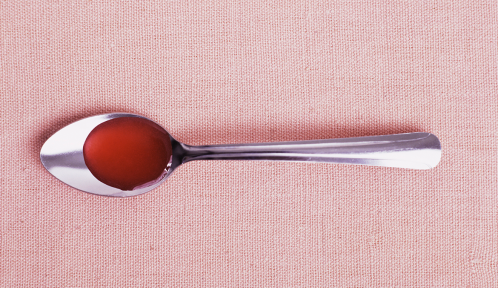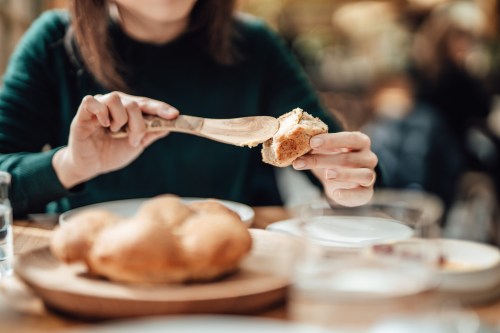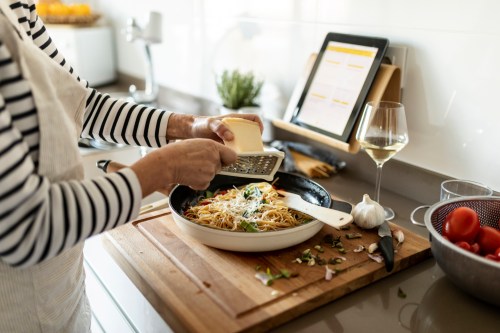Here’s What a Toxicologist and Internal Medicine Doctor Say Can Happen to Your Body if You, Um, Boil Chicken in NyQuil
Medical professionals and a toxicologist share what can happen to your body if you partake in the viral “sleepy chicken” TikTok trend.

While we can certainly thank social media for the occasional fun food trend, it also can be a medium that spreads harmful and potentially life-threatening misinformation. Take, for example, the “tide pod challenge” that circulated on platforms in 2018, encouraging people to intentionally consume the pods filled with liquid detergent.
Experts in This Article
internal medicine doctor, author, and senior director of science and clinical innovation at Big Bold Health
medical toxicologist and co-medical director of the National Capital Poison Center
Maya Feller, MS, RD, CDN of Brooklyn-based Maya Feller Nutrition is a registered dietitian nutritionist who works with patients looking for nutritional management of diet related chronic illnesses with medical nutrition therapy. She is also adjunct faculty at New York University. Maya is dedicated to promoting nutrition education that helps the public to make informed food choices that support health and longevity.
Most recently—in another case of viral TikTok videos gone dangerously wrong—users have been sharing cooking tutorials on how to make “sleepy chicken,” which refers to chicken that gets submerged in a pool of NyQuil. This over-the-counter (OTC) medication is made from a mixture of acetaminophen, dextromethorphan, and doxylamine, and is meant to treat nighttime symptoms of the common cold and flu, including inducing drowsiness.
While this “recipe” may sound unequivocally disturbing and dangerous, keep in mind that adolescents and young adults are highly susceptible to this form of dare or “challenge” sparked by social media trends, says a statement released by the U.S. Food and Drug Administration (FDA). “One social media trend relying on peer pressure is online video clips of people misusing nonprescription medications and encouraging viewers to do so too. These video challenges, which often target youths, can harm people—and even cause death,” the FDA says.
To learn about the harms of consuming “sleepy chicken,” we spoke with a toxicologist and an internal medicine doctor about the dangers of this viral trend and the effects it may have upon consumption (or even inhalation).
The explicit danger of partaking in the viral “sleepy chicken” TikTok trend
According to Kelly Johnson-Arbor, MD, FACEP, FUHM, FACMT, a medical toxicologist and co-medical director at the National Capital Poison Center, this dangerous trend has been circulating the internet for more than eight months and poses a serious threat to the public.
“The NyQuil Chicken trend is potentially dangerous because cough and cold medications, such as NyQuil, can cause unwanted symptoms—some of which can be life-threatening—when used incorrectly,” Dr. Johnson-Arbor says. She is particularly concerned about how the amount of NyQuil consumed. “In the TikTok videos, people typically pour an entire bottle of NyQuil into the pan in which the chicken is being cooked. This means that the chicken is being marinated in high doses of NyQuil—and high doses of acetaminophen, doxylamine, dextromethorphan, or whatever other medications are contained in the NyQuil,” she says. According to the NyQuil website, the average serving of the liquid medication is 30 milliliters, about two tablespoons, every six hours. (An average NyQuil Cold and Flu bottle contains about 354 milliliters).
Austin Perlmutter, MD, an internal medicine doctor, author, and senior director of science and clinical innovation at Big Bold Health, shares similar concerns, and adds that cooking the NyQuil for extended periods of time can lead to consuming a super concentrated version of the drug due to the evaporation of alcohol in the liquid medication. “In the NyQuil chicken challenge, people are often using large quantities of the liquid and cooking it down, which can concentrate the ingredients and lead to potential toxicity when the chicken is consumed,” he says. “This is definitely one social trend worth avoiding.”
So, what exactly can happen if you consume NyQuil “sleepy chicken”?
In short, consuming NyQuil in large doses all at once can lead to severe side effects or, worse, poisoning or death. “People who eat the NyQuil-marinated chicken may experience acetaminophen poisoning, which can lead to liver failure and death. They can also experience hallucinations, blurred vision, and seizures from dextromethorphan and doxylamine overdose, among other undesirable symptoms,” Dr. Johnson-Arbor says.
While Dr. Perlmutter says that the acetaminophen in Nyquil can act as a fever reducer in lower doses, “when taken in high doses, it can lead to liver damage and worse.”
Overdosing on the other ingredients in the drug is similarly harmful. “At higher levels of intake, [dextromethorphan] is linked to GI issues, heart palpitations, and dizziness. Acute psychosis has been reported at very high levels of consumption. Same goes for the phenylephrine and doxylamine in the liquid—these have both been linked to a range of significant side effects when taken in higher doses,” says Dr. Perlmutter.
But eating NyQuil chicken isn’t the only concern. The FDA also warns that inhaling vapors while heating it can also cause harmful side effects. “Even if you don’t eat the chicken, inhaling the medication’s vapors while cooking could cause high levels of the drugs to enter your body. It could also hurt your lungs. Put simply: Someone could take a dangerously high amount of the cough and cold medicine without even realizing it,” says the FDA in their statement.
The extreme danger of social media trends
Of course, not all trends that emerge from social media pose a threat to society. “Some social media trends, like the ice bucket challenge, are innocuous, while others—like this one, the cinnamon challenge, and the Benadryl challenge—are potentially very dangerous,” Dr. Johnson-Arbor says. “Overall, though, I think people should be very cautious when engaging in TikTok or other social media trends, as the influencers creating the videos may not be knowledgeable about all of the risks associated with the trends that they are promoting.”
As a final note, Dr. Johnson-Arbor wants to remind everyone that even over-the-counter medications (and, for that matter, social media) should be used with caution. “Please remember that all medications, even over-the-counter drugs, are potentially dangerous when used incorrectly or in overdose. If people develop unexpected or unwanted symptoms after taking NyQuil, contact poison control for expert and non-judgmental advice. There are two ways to reach poison control in the United States: online at www.poison.org or by phone at 1-800-222-1222. Both options are free, confidential, and available 24 hours a day,” she says.
Sign Up for Our Daily Newsletter
Get all the latest in wellness, trends, food, fitness, beauty, and more delivered right to your inbox.
Got it, you've been added to our email list.










